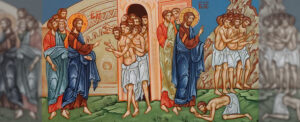Modern Christianity often points to Old Testament sacrifices to explain Christ’s offering on the Cross, but it’s often done in a sloppy and inaccurate way.
Modern teachers tend to mix up the scapegoat and the sin offering. The sins of the people were ritually loaded on the scapegoat, but it was not sacrificed. Rather, it was sent out into the wilderness. Sin came into the people of God from hostile alien powers, and is sent back out to them.
Then the spotless, pure sacrifice is offered for sins – but there is no imputation of sin. That is, the part where the sins of the people are laid on the scapegoat is not done with the sin offering. Why? Because the point of offering God a pure, spotless lamb is to give him something that pleases him – purity, innocence, beauty and life. Why would anyone want to offer God an impure, polluted, guilty sacrifice? God has never asked for that. Blood stands for life, and the blood that is sprinkled on the Ark is not given as evidence of punishment. It is there to represent the salvation, righteousness, and holiness that came in the beginning from God and is offered to him in fellowship, thanksgiving, and purification. It is significant that the Christian act of worship is named eucharist, a thank offering, not a sacrifice of atonement. “A mercy of peace, a sacrifice of praise.”
Annually (and not for atonement) the Passover Lamb (Pesach or Pascha) is killed in order to put its blood on the doorposts for protection from judgment; the blood indicates membership in the protected group. This is certainly fulfilled in Christ, but there is no connection to sin offerings; the Pascha is not a substitution for sin or guilt.
Finally, there are peace offerings, fellowship offerings, freewill offerings and thanksgivings, especially after purification from illness or ritual impurity. Again, these are not connected with atonement for sins, they are freely offered as an expression of love to God. These offerings fulfill the ancient understanding of a sacrifice as a meal shared together with one’s God.
There certainly is a scriptural and patristic teaching on substitution. But it is not at all the chief metaphor used to understand the Cross. And when we try to read every sacrifice as a substitutionary punishment for sins, we are reading American Evangelical doctrines into the Bible.






